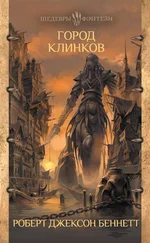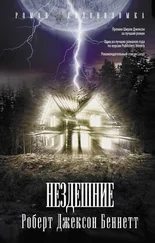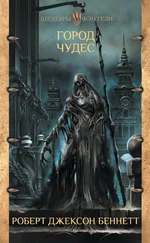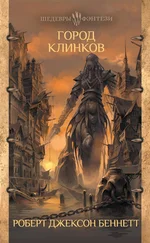said Clef’s voice, soft and sad.
Orso stood in front of the closed-down taverna and tried not to sweat. He had many reasons to — for one, he was wearing quite a lot of clothes, in a clumsy attempt to disguise himself. For another, he was on the Candiano campo using a false sachet that Claudia and Giovanni had supplied him with. And for another, there was a significant chance that none of this ploy could work. She might not come — and then they’d have wasted another day.
He turned around and looked at the taverna. It was old and crumbling, its moss clay cracking, its windows broken or gone. The canal it overlooked was not the blossoming, picturesque stream Orso remembered, but a fetid, reeking mire. Nearly all of the balconies were gone, apparently fallen away — but one remained.
Orso stared at the balcony. He remembered how it had looked twenty years ago — the lights around it bright and beautiful, the smell of wine and flowers. And how beautiful she’d looked that night, until he’d spoken his heart.
That’s not true , he thought. She was still beautiful, even after that.
He sighed and leaned against the fence.
She won’t come , he thought. Why would she come to this painful memory? Why am I even here?
Then he heard footsteps in the alley behind.
He turned and saw a woman approaching, dressed like a house servant, wearing a muddy-colored dress and a dull, unadorned wimple that covered most of her face. She walked right up to him, her eyes steady and still.
“The theatrics of youth,” she said, “are unbecoming to aged folk such as we.”
“I’m a hell of a lot more aged than you are,” he said. “I think I have more right to say what’s unbecoming and what isn’t. I’m amazed you’re here. I can’t believe you still had it, that it worked!”
“I kept the hand-harp for lots of reasons, Orso,” said Estelle. “Some sentimental. But also because I made it, and I think I did a good job.” She was referring to the twinned hand-harps she’d scrived, back when she and Orso had been young and attempting to be surreptitious with their relationship. It had been their way of communicating: pluck a certain series of strings, and the other harp would make the same tune. Each note had been a code for where and when they should meet, and this taverna had once been a favorite of theirs.
Orso had always kept his harp, perhaps out of fondness — he’d had no idea he’d need it again one day, certainly not for this.
She peered at the taverna. “So many things have dried up and faded away on the campo,” she said quietly, “that it feels odd to mourn the loss of a single taverna. Yet I do.”
“If I could have gotten a message to you to meet somewhere else,” he said, “I would have.”
“Shall we go inside?” said Estelle.
“Really? It looks like it’s falling apart.”
“You’re the one who started me reliving my memories, Orso, when you plucked the harp. I wish to continue.”
They walked up the steps and through the broken doors. The vaulted ceilings were still intact, as were the tiled floors, but that was about it. The tables were gone, the bar had fallen to pieces, and vines were erupting from the walls.
“I take it,” she said quietly as she walked through the ruins, “that you’re not here to whisk me away, and make me your own.”
“No,” said Orso. “I have something to ask of you.”
“Of course. A sentimental tool, a sentimental place, used for unsentimental ends.”
“I need something from you, Estelle. Something mad.”
“How mad? And why?”
He told her only what she needed to know. She listened quietly.
“So,” she said. “You…think my father was close to figuring out how the hierophants made their tools. And you think my husband is now trying to duplicate his efforts — and has killed many people in the process.”
“Yes.”
She stared out the windows at the one remaining balcony. “And you need my father’s blood. To make it through the Mountain, to steal this device from Tomas, and cripple his efforts.”
“Yes. Will you help us?”
She blinked slowly. “That was the place, wasn’t it?” she whispered.
He looked, and saw she meant the balcony before them. “Yes,” he said. “It was.”
“I want to see it.”
“It looks terribly unsafe.”
“I said see , not stand on.” She walked over to the doors, reached out to open them, and then winced and grabbed her side. “Agh…I’m sorry. Orso — can you…?”
“Certainly,” he said. He walked over to the doors and opened them for her.
“Thank you,” she said. She looked out at the balcony and the dreary sight of the canal below. She sighed, like the sight of it pained her.
“Are you hurt, Estelle?” he said.
“I fell recently. I hurt my elbow, I’m afraid.”
“You fell?”
“Yes. While climbing the stairs.”
He watched her for a long time, looking her over. Was he imagining it, or was she standing somewhat…crooked? As if walking on a ginger knee?
“You didn’t fall, did you,” he said.
She said nothing.
“It was Tomas,” he said. “He did this to you. Didn’t he?”
She was still for a long time. “Why did you leave, Orso? Why did you leave the house? Why did you leave me there, alone, with my father?”
Orso was silent as he thought about how to answer. “I…I asked you to marry me,” he said.
“Yes.”
“On this very balcony.”
“Yes.”
“And…you said no. Because of the inheritance laws on the campo, everything you owned would go to me. You said you wanted to prove to your father that you could be as good as him, that you could be a scriver, a leader, someone who could guide the house. You thought he could change the rules for you. But…I knew he wouldn’t ever do that. Tribuno was a foresighted man in many ways. But he was also terribly…traditional.”
“Traditional,” she echoed. “What a curious word that is. So bland, and yet often so poisonous.”
“He mentioned it to me, once. Asked me why we weren’t engaged yet. I told him you were considering your options. And he said, ‘If you want, Orso — I could just make her.’ As if I would ask for that. As if having you by force was the same as having you. So there I was. Stuck between two people I found increasingly unpleasant or…painful.”
“I see,” she said quietly.
“I’m…sorry,” said Orso. “I’m sorry for all that’s happened to you. If I’d known how things were going to go — if I’d known how deeply in debt Tribuno had gone, I’d…”
“You’d what?”
“Have tried to steal you away, I guess. Flee the city. Go somewhere new, and leave all this behind.”
She laughed quietly. “Oh, Orso…I knew you were still a romantic, down underneath it all. Don’t you see? I’d never have left. I’d have stayed and fought for what I felt I was due.” She grew solemn. “I’ll help you.”
“You…you will?”
“Yes. Father gets bled frequently for his condition. And I know a way into the Mountain. A way designed just for him, one Tomas has never known about.”
Читать дальше
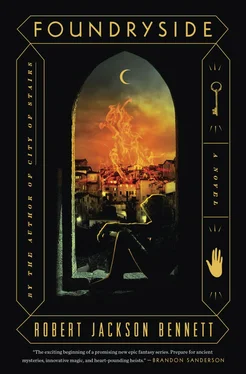


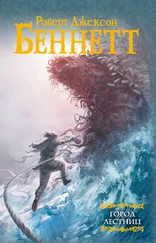


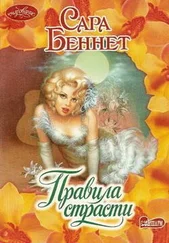

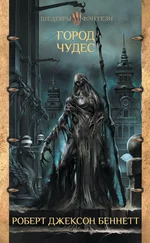
![Роберт Беннет - Город чудес [litres]](/books/405553/robert-bennet-gorod-chudes-litres-thumb.webp)
